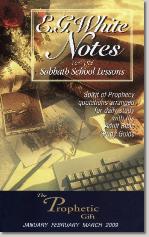|
||||||||||||||||||||
Commentary on "The Authority of the Prophets"
Day 3: Monday, February 16, 2009
In this lesson, Jesus is described as having the highest authority exercised by a human person on the earth. He is presented as teaching with the highest authority, exorcising people and commanding the forces of nature. His authority is supreme, yet it is nevertheless in dependence and in cooperation with the Father. The study title, “the Authority of the Incarnate Word”, prepares the way for the study of the next day, “The authority of the Written Word”
Problems
There are two affirmations which on one side try to establish Christ’s authority as Creator, absolute, independent of anybody else, and on the other side present his authority as dependable on God.
“Ultimate authority belongs to Christ as our Creator (John 1:3) and Redeemer (Rom. 3:24). He is at once the final court of appeal and the absolute norm by which each life is to be judged. Divine authority finds its focus and finality in Him.”
“Yet, the authority that Christ exercised within His earthly commission was granted to Him by the Father (John 17:2). Whatever He did, including all the miracles He performed, always was done in dependence on and in cooperation with His Father (John 5:19).”
The language is biblical as far as it goes; still, it is vague enough to leave open the possibility of Jesus having a delegated authority, derived from the Father’s authority in a way which stands in opposition to his intrinsic authority as Creator.
Unfortunately, stating that all the miracles Jesus performed were done in dependence on His Father is in harmony with the thesis that Jesus renounced his divine attributes when he became incarnate, living on earth as a simple human being in dependence on the Father as any other human being is also dependent on God. His miracles, according to the Adventist understanding, were not miracles performed because He was intrinsically divine, but only through the Father’s divine intervention in his behalf. He remained and functioned basically as a human being, somehow being still the same Person of deity but without its divine attributes.
Jesus was one with his Father, one being. He was distinct from the Father but never separated. The Bible uses the language of cooperation between Christ incarnate and his Father, because by definition the acts of one Person of the Trinity cannot be done without the involvement of the others, since they are one Being. This means that there is harmony and functionality between the three Persons; there is subordination between the Son, the Father, and the Holy Spirit in which each of them has the role of bringing glory to the others: the Son to the Father, the Holy Spirit to the Son and the Father to the Son. But these different roles do not infringe on their intrinsic equality and do not presuppose dependence as there is between creature and Creator. Jesus remained the only true and eternal God even when he took upon Himself the very nature of man. The incarnation had not impacted Jesus’ divinity and essential unity with the Father.
When he was on earth, Jesus was the Word of God. He was not just a prophet transmitting the Word of God, He was the Word of God incarnate, the same Word that was in the beginning with God and who was God (John 1:1, 14). Consequently, His authority was not derived from Father’s calling in the same way as the authority of other prophets was derived. He was not a man through whom God performed his work; he was God himself with all attributes of divinity working for the salvation of the world.
Summary
- Unfortunately, in Adventist theology, Jesus in his earthly life emptied himself of divine attributes, living as a man in total dependence on his Father in order to be our example, and the present lesson does nothing to bring the needful correction. Jesus as primarily example for believers rather than as Savior is unfortunately the bedrock of legalism. Jesus’ life as example for us to imitate is not the Bible’s emphasis. Rather it is Jesus’ life, death for our sins, and resurrection for our justification, for our benefit, that is the first and foremost truth we need to know and believe about Jesus. Surely, we are called to a life of obedience to our blessed Lord and Savior, but if this life becomes the primary focus, it moves our attention from Jesus to us, to what happens in us. And anything that makes the truth of our salvation less important, replacing it with our obedience as the primary focus is working against the gospel.
Copyright 2009 BibleStudiesForAdventists.com. All rights reserved. Revised February 14, 2009. This website is published by Life Assurance Ministries, Glendale, Arizona, USA, the publisher of Proclamation! Magazine. Contact email: BibleStudiesForAdventists@gmail.com.


The Sabbath School Bible Study Guide and the corresponding E.G. White Notes are published by Pacific Press Publishing Association, which is owned and operated by the Seventh-day Adventist church. The current quarter's editions are pictured above.
Official Adventist Resources
Standard Edition Study Guide Week 8
Teacher's Edition Study Guide Week 8
Easy Reading Edition Study Guide Week 8
Search the Complete Published Ellen G. White Writings
